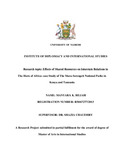| dc.description.abstract | Kenya and Tanzania spend huge amounts of capital to develop nature-reserves, which are
enormous regions of their territory, with examples of the Maasai Mara National Reserve and the
Serengeti National Park. However, due to non-existence of proper taxation systems, corruption
alongside ineffective administration that lack modernized information technology; these reserves
get to be highly unprofitable. The result of unprofitability, raise the inability of the states to run
the nature reserves, putting both countries into constant affirmations of seeking monetary
infusions from industrialized nations. The seek for aid, constantly puts the two states in a
dilemma, over who benefits most from the nature reserves, creating mistrust among the two, on
economic gains from international community based aid and donations, meant to maintain the
nature reserves. As a result, numerous effects of these shared resources get to emerge, affecting
the interstate relations what could be identified to be the ‘tragedy of the commons’. Therefore,
through study objectives that sought to identify and assess the effects of shared resources on
interstate relations, the study investigated strategies used in addressing these effects and
recommend on workable policies and activities that assisted in addressing the effects. The study
area was identified through stratified sampling from a list of many interstate shared resources
considering the fact that it meets the threshold and scope of the study. The research targeted to
interview a total of 15 participants. Other data was collected through multiplicity of data
collection methods among them; questionnaire, in-depth interview and observation. Data
collected was analysed through qualitative and quantitative data analysis methods and then key
findings of this study revealed for recommendations. The study found that sharing of natural
resources has an impact on interstate relations. The study found that scarcity of these natural
resources, territorial conflicts, political conflicts, revenue administration are the main causes of
conflicts between states sharing natural resources. The study concluded that natural resources
have an effect on interstate relations. The study recommended that Kenya and Tanzania should
implement agreements by mapping the border according to the international regulations
governing sharing of natural resources. | en_US |

